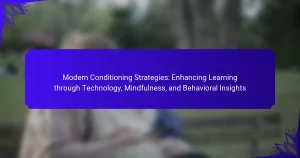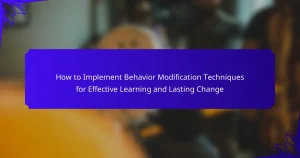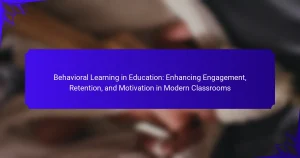Education plays a crucial role in fostering independent thinking by enhancing critical analysis and problem-solving skills. It promotes inquiry-based learning and collaboration, which are essential for creativity and self-reliance. Effective strategies like project-based learning and Socratic questioning empower students to engage deeply with concepts. Additionally, attributes such as adaptability and metacognition further enrich the learning experience, preparing individuals for real-world challenges.
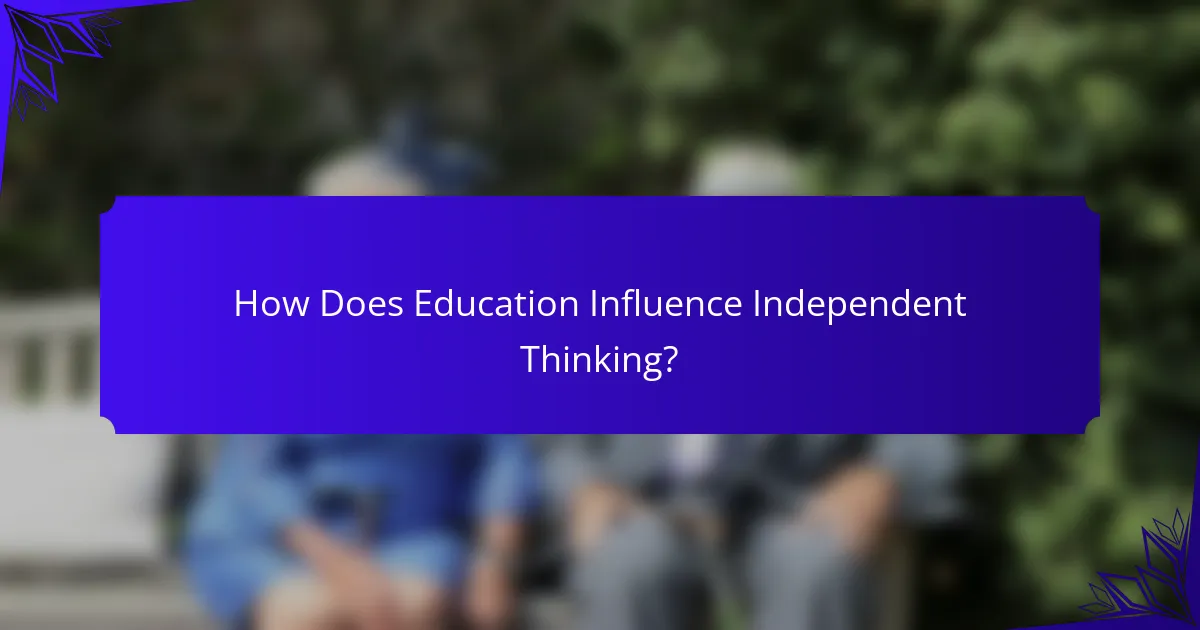
How Does Education Influence Independent Thinking?
Education significantly enhances independent thinking by promoting critical analysis and problem-solving skills. It encourages students to question assumptions and explore diverse perspectives. Research indicates that students exposed to inquiry-based learning develop stronger analytical abilities. Furthermore, collaborative projects foster creativity and self-reliance, essential for independent thought. Overall, a well-structured educational environment cultivates these vital skills, preparing individuals for complex decision-making in real-world scenarios.
What Are the Key Components of Independent Thinking?
Independent thinking involves critical analysis, creativity, and problem-solving. Key components include self-reflection, open-mindedness, and the ability to evaluate evidence. Education fosters these skills by encouraging inquiry, promoting diverse perspectives, and developing analytical abilities. Engaging in discussions and debates enhances independent thought, allowing learners to challenge assumptions and explore new ideas.
Why is Critical Thinking Essential in Modern Education?
Critical thinking is essential in modern education as it empowers students to analyze, evaluate, and synthesize information effectively. This skill fosters independent thinking, enabling learners to navigate complex problems and make informed decisions.
Education systems increasingly prioritize critical thinking to prepare students for real-world challenges. Research indicates that students who engage in critical thinking demonstrate improved problem-solving abilities and creativity. These skills are crucial in a rapidly changing job market where adaptability is key.
Moreover, fostering an environment that encourages questioning and exploration enhances student engagement. This unique approach cultivates a mindset geared towards lifelong learning, essential in today’s knowledge-driven society.
As a result, integrating critical thinking into curricula not only benefits individual learners but also contributes to a more informed and capable society.
What Skills Constitute Critical Thinking?
Critical thinking encompasses skills such as analysis, evaluation, inference, and problem-solving. These skills enable individuals to assess information, make informed decisions, and approach problems logically. Education plays a crucial role in cultivating these skills by encouraging inquiry and independent thought. Engaging in discussions, debates, and reflective practices enhances critical thinking abilities. Research indicates that students who practice these skills demonstrate improved academic performance and better decision-making in real-life situations.
How Can Critical Thinking Be Measured?
Critical thinking can be measured through assessments that evaluate reasoning, problem-solving, and decision-making skills. Tools like standardized tests, performance tasks, and reflective journals provide insights into a learner’s critical thinking abilities. These methods assess attributes such as analysis, synthesis, and evaluation, which are crucial for independent thinking. For example, performance tasks often simulate real-world scenarios, allowing educators to gauge how students apply critical skills in practice.

What Are the Universal Attributes of Effective Education?
Effective education fosters independent thinking by emphasizing critical skills like analysis, evaluation, and creativity. These skills enable learners to navigate complex information and make informed decisions. Root attributes include engagement and adaptability, which enhance learner motivation and responsiveness to diverse learning environments. Unique attributes such as collaboration and problem-solving further enrich educational experiences, preparing students for real-world challenges. As a result, effective education cultivates a generation capable of innovative thinking and resilient problem-solving.
How Does Curriculum Design Impact Independent Thought?
Curriculum design significantly influences independent thought by encouraging critical thinking and problem-solving skills. A well-structured curriculum integrates inquiry-based learning, fostering an environment where students explore concepts rather than memorize facts. This approach enhances students’ ability to analyze, evaluate, and create, essential components of independent thought. Moreover, incorporating diverse perspectives within the curriculum promotes open-mindedness and adaptability, further supporting critical skills development. Engaging students in real-world applications solidifies their understanding and cultivates a mindset geared towards lifelong learning.
What Role Do Educators Play in Fostering Critical Skills?
Educators are crucial in fostering critical skills by encouraging independent thinking and problem-solving. They create an environment that promotes inquiry, creativity, and analytical reasoning. By utilizing diverse teaching methods and real-world applications, educators help students connect theoretical knowledge to practical situations, enhancing their critical thinking abilities. Research indicates that classrooms emphasizing discussion and collaboration significantly improve students’ critical skills. Moreover, educators serve as role models, demonstrating the value of questioning assumptions and exploring multiple perspectives, which is essential for developing independent thinkers.
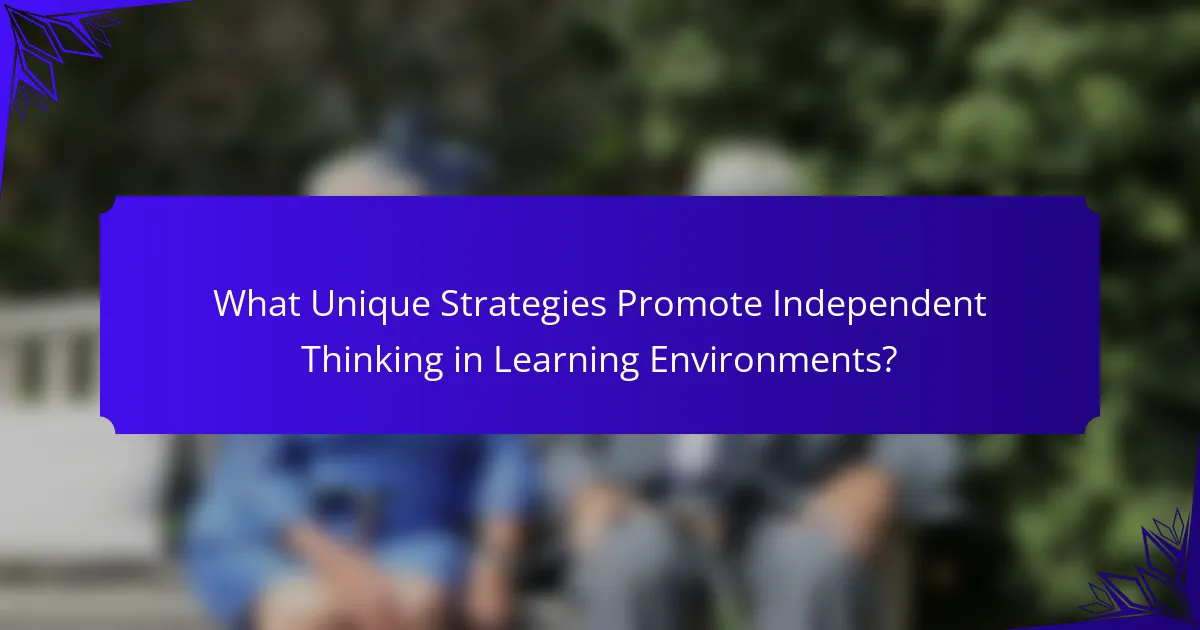
What Unique Strategies Promote Independent Thinking in Learning Environments?
Encouraging independent thinking in learning environments involves unique strategies like project-based learning, Socratic questioning, and fostering a growth mindset. These methods empower students to explore concepts deeply and develop critical thinking skills. Project-based learning promotes autonomy by allowing students to pursue their interests within a structured framework. Socratic questioning encourages dialogue and reflection, pushing students to articulate their reasoning. A growth mindset instills resilience, motivating learners to embrace challenges and learn from failures. Together, these strategies create a dynamic atmosphere that nurtures independent thought.
How Can Project-Based Learning Enhance Critical Skills?
Project-based learning significantly enhances critical skills by fostering independent thinking and problem-solving abilities. This approach engages students in real-world challenges, promoting active learning and collaboration. Research indicates that students involved in project-based learning demonstrate improved analytical skills and creativity. Moreover, they develop adaptability, as they must navigate complex situations and make decisions. This method not only cultivates critical thinking but also prepares learners for future professional environments where these skills are essential.
What Is the Impact of Technology on Independent Learning?
Technology significantly enhances independent learning by providing access to diverse resources and fostering critical thinking skills. Digital platforms enable personalized learning experiences, allowing learners to engage with materials at their own pace. For example, online courses and educational apps promote self-directed study and problem-solving abilities. Furthermore, technology facilitates collaboration among peers, encouraging discussion and feedback, which are vital for developing independent thought. As a result, students become more adept at analyzing information and forming their own opinions, crucial skills in today’s information-rich environment.
How Can Digital Tools Facilitate Critical Thinking?
Digital tools enhance critical thinking by providing resources for analysis, collaboration, and reflection. They enable students to access diverse perspectives and engage in problem-solving activities. For instance, platforms like discussion forums facilitate debate, while data visualization tools help interpret complex information. These tools foster independent thinking by encouraging learners to question assumptions and develop their reasoning skills. As a result, students become more adept at evaluating evidence and constructing well-supported arguments.
What Are the Benefits of Collaborative Learning?
Collaborative learning enhances critical thinking and problem-solving skills. It encourages students to engage actively, share diverse perspectives, and develop teamwork abilities. Research indicates that students involved in collaborative learning outperform peers in independent tasks, showcasing improved retention and application of knowledge. This method fosters deeper understanding and prepares learners for real-world challenges.

What Rare Attributes Contribute to Effective Learning?
Rare attributes that contribute to effective learning include adaptability, metacognition, and interdisciplinary connections. Adaptability allows learners to adjust strategies based on feedback and changing circumstances. Metacognition enhances self-awareness in learning processes, enabling students to evaluate their understanding and approach. Interdisciplinary connections foster critical thinking by integrating knowledge across various fields, promoting a holistic understanding of concepts. These attributes empower learners to think independently and critically in modern educational environments.
How Does Cultural Context Shape Independent Thinking?
Cultural context significantly influences independent thinking by shaping perspectives and critical skills. Education systems vary globally, impacting how students engage with ideas. For instance, collectivist cultures may prioritize group consensus, while individualistic cultures encourage personal viewpoints. This distinction affects critical thinking development. Educational approaches that incorporate diverse cultural contexts foster adaptability and creativity, essential for modern learning. Emphasizing critical skills within these frameworks enhances independent thinking, preparing students for global challenges.
What Are the Challenges of Fostering Independent Thought in Diverse Classrooms?
Fostering independent thought in diverse classrooms presents challenges such as varying cultural perspectives, differing learning styles, and potential biases. These factors can hinder open dialogue and critical thinking. Educators must navigate these complexities to create an inclusive environment that encourages all students to express their ideas. Effective strategies include promoting collaborative learning, integrating diverse viewpoints, and providing tailored support. Addressing these challenges is essential for developing critical skills in modern education.
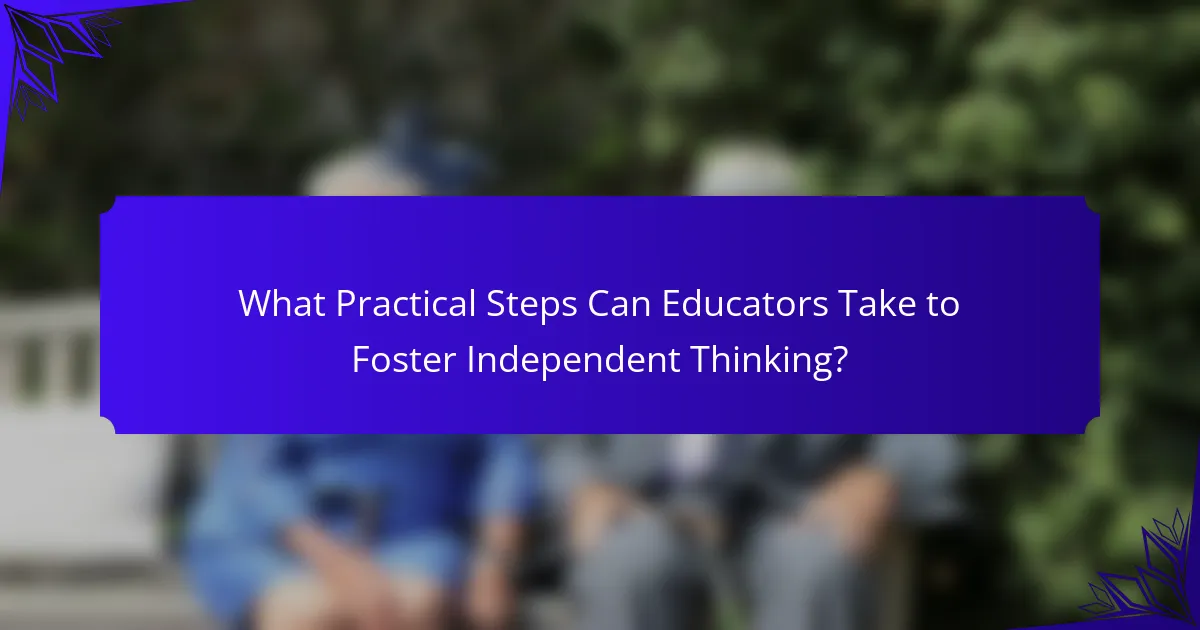
What Practical Steps Can Educators Take to Foster Independent Thinking?
Educators can implement specific strategies to cultivate independent thinking among students. Encouraging open-ended questions promotes critical analysis, while collaborative projects enhance problem-solving skills. Integrating real-world scenarios into lessons allows students to apply knowledge practically. Providing opportunities for self-directed learning fosters ownership of education. Lastly, creating a supportive environment where mistakes are viewed as learning opportunities enhances confidence and creativity.
What Are the Best Practices for Encouraging Critical Skills?
Encouraging critical skills in education involves fostering independent thinking through interactive learning, collaboration, and real-world problem-solving. Active engagement promotes deeper understanding and retention.
1. Implement project-based learning to enhance critical analysis.
2. Encourage open discussions to develop diverse perspectives.
3. Utilize technology for collaborative problem-solving experiences.
4. Provide constructive feedback to guide independent thought.
5. Integrate interdisciplinary approaches to foster holistic thinking.
What Common Mistakes Should Educators Avoid?
Educators should avoid fostering dependence on rote memorization and neglecting critical thinking skills. Focusing solely on standardized testing can stifle creativity and independent thought. Additionally, failing to encourage student participation limits engagement and ownership of learning. Ignoring diverse learning styles can hinder students’ ability to think critically. Lastly, underestimating the importance of real-world applications may disconnect students from practical problem-solving.
How Can Educators Continuously Improve Their Approaches?
Educators can continuously improve their approaches by fostering independent thinking and critical skills. They should implement reflective practices, collaborate with peers, and integrate student feedback into their teaching methods.
Regular professional development is crucial, focusing on innovative instructional strategies that promote critical thinking. For example, educators can use project-based learning, which encourages students to solve real-world problems, enhancing their analytical skills.
Additionally, leveraging technology can provide diverse resources and learning tools, making education more engaging. Educators should also assess their effectiveness through student outcomes, adapting their methods based on performance data.
Finally, creating a supportive classroom environment that values questioning and exploration will empower students to think independently, ultimately improving educational outcomes.
